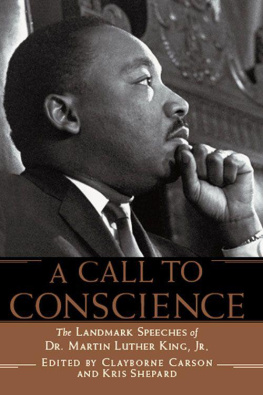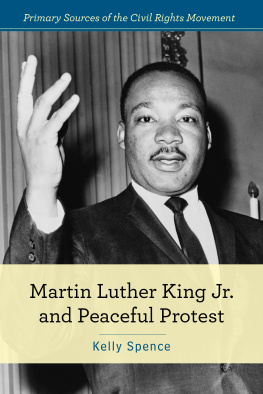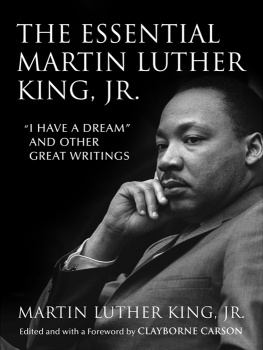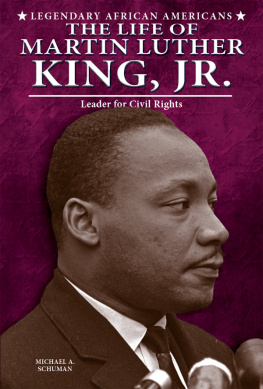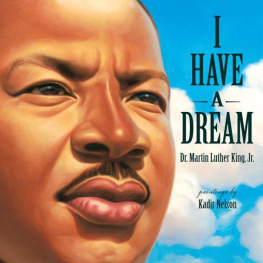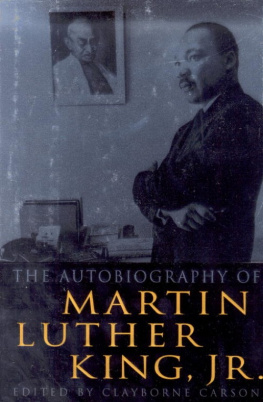Sermons used by permission of Intellectual Properties Management, Atlanta, Georgia, as Exclusive Manager of the Estate of Martin Luther King, Jr.
A CALL TO CONSCIENCE. Copyright 2001 by The Heirs to the Estate of Martin Luther King, Jr. All rights reserved. No part of this book may be reproduced in any form or by any electronic or mechanical means, including information storage and retrieval systems, without permission in writing from the publisher, except by a reviewer who may quote brief passages in a review.
Hachette Book Group
237 Park Avenue
New York, NY 10017
Visit our website at www.HachetteBookGroup.com.
ISBN: 978-0-7595-2008-0
First eBook Edition: January 2001
Contents

BY ANDREW YOUNG
M artin Luther King, Jr., was the Voice of the Centuryg. No voice more clearly delineted the moral issues of the second half of the twentieth century and no vision more profoundly inspired peoplefrom the American South to southern Africa, from the Berlin Wall to the Great Wall of China. Martin Luther King, Jr.s dream of American moral possibilities expressed a universal hope for mankind that derived heavily from the Hebrew prophets, the teachings of Jesus of Nazareth, and the nonviolent actions of Indias Mahatma Gandhi.
Martins voice was more than the communication of intellectual ideals and spiritual vision. It was a call for action, action which he personally led from the early days of the Montgomery bus boycott in 1955 until his assassination in Memphis in 1968.
Martin spoke with the passion and poetry of the prophets of old. He proclaimed for our time the faith that justice can and will prevail. He saw leadership as a process of relating the daily plight of humankind to the eternal truths of creation. For him, as he proclaimed at the funeral of three of the four little girls killed in the bombing of the Sixteenth Street Baptist Church in Birmingham:
Death is not a period that ends the great sentence of life, but a comma that punctuates it to more lofty significance. Death is not a blind alley that leads the human race into a state of nothingness, but an open door which leads man into life eternal. Let this daring faith, this great invincible surmise, be your sustaining power during these trying days.
Martin was first of all a man of faith, a preacher of the Gospel of Jesus with its hope in a resurrection not only of his spiritual body, but also the social expansion of the ideals by which he preached and lived.
Martins life was an effort to infuse our complex political and social existence with the spiritual power of ultimate reality, to use Paul Tillichs phrase. To the millions who were moved to rise up on the powerful emotional cadences of his oratory, it was nothing less than the voice of God coming through the life of one of his young, humble, and obedient servants. His oratory sought to forge a new state of justice with mercy through the power of truth without violencetruth that sought to bring all men and women together as brothers and sisters: truth spoken in love and mercy that believed the worlds conflicts could be reconciled in the power of the human spirit without resorting to violence.
Martin never reached the age of forty, being shot by a single rifle bullet just a few months after his thirty-ninth birthday. He always knew that martyrdom was the potential price of challenging Americas version of racial separation.
Try though he might, he could not escape the burden of leadership. In 1954 King left Boston University for the sleepy southern town of Montgomery, Alabama, seeking the peace and quiet of small town life. While pastor of the relatively small but prominent Dexter Avenue Baptist Church, he hoped to have the time and freedom to complete his doctoral dissertation in systematic theology. Just a few months after his dissertation was submitted, however, Rosa Parkss arrest on one of Montgomerys segregated buses and the subsequent boycott thrust him onto the national stage. He soon found himself selected Time magazines Man of the Year, an honor bestowed before he was even thirty years old.
From that moment on, Martin came to symbolize and vocalize the hopes and aspirations of oppressed people all over the planet. The rich Negro spiritual We Shall Overcome became the nonviolent anthem of men and women the world over.
The most remarkable aspect of this moral crusade was that he expanded on Gandhis use of nonviolence and the force of truth to liberate not only the former sons and daughters of slaves but the sons and daughters of slave owners as well. The message, though essentially spiritual, was nevertheless powerfully political, causing governments to fall, wars to end, and the courts and Congress of the United States to radically expand the human rights vision of the U.S. Constitution to include the enforcement of new freedoms for the sons and daughters of former African slaves. This same message soon inspired movements for the liberation of women, Hispanic Americans, native Americans, children, and the physically handicapped, and led, ultimately, to a rising tide of expectations through the globe. Todays New South and the election of three sons of the South to the United States presidency can all be attributed to the struggle that Martin led to fulfill the American Dream without resorting to the destruction of either persons or property.
For Martin, social justice would not roll in on the wings of inevitability but would come through struggle and sacrifice.
* * *
His Montgomery speeches helped desegregate city buses. His Birmingham and Lincoln Memorial speeches sparked the passage of the Civil Rights Act of 1964, putting an end to legal segregation of the races. In Selma, he successfully called for the right to vote. His condemnation of the war in Vietnam was instrumental in ending Americas involvement in that conflict. In 1968 he was killed while struggling with Memphis sanitation workers to put an end to their poverty.
This is a unique way to read and understand history: from its primary sources. These speeches grew out of and helped to shape the moral challenges of the second half of the twentieth century. This marvelous compilation of Martins words and witness were each tied to a specific challenge of injustice. He never sought a confrontation with evil. He was essentially a husband, father, and pastor of the Baptist Church, as were his father and grandfather before him.
Events in the American South and southern Africa, as well as the relatively peaceful democratic transformation of eastern Europe, have proved him right in seeing nonviolence as the best way to resolve the worlds problems, while conflicts from Bosnia to Liberia continue to prove the futility of violence.
Perhaps reading these eloquent proclamations of a man of organized, aggressive, and positive goodwill, who loved his adversaries as brothers and who gave his life in an attempt to redeem the soul of America from the triple evils of racism, war and poverty, will show us the way into the new millennium and help us to continue to live these truths in the days to come.
ANDREW YOUNG worked closely with Dr. King in the Southern Christian Leadership Conference on efforts such as citizenship education and voter registration. Elected to the United States House of Representatives in 1973, Young was the first black representative from Georgia since Reconstruction. After serving as U.S. ambassador to the United Nations, he was twice elected mayor of Atlanta, Georgia, and received the Presidential Medal of Freedom, Americas highest civilian award. He is currently head of Good Works International, LLC.


